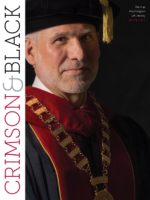
One of the hardest things about being a first-generation college student is you don’t know what you don’t know.
How to fill out an application, where to learn about financial aid, what to expect when you arrive on campus—plus dozens of other questions that traditional students can discern by talking to their parents or siblings.
CWU understands the struggles first-gen students must endure when seeking information about college, and it has taken the lead among the state’s higher education institutions in providing everyone with equal access and opportunity.
“First-generation students tend to feel uncertain and question if they belong at a university,” said Melanie Palm (’07), regional director at CWU-Yakima, one of eight university centers and instructional sites around the state.
“CWU excels at working with these students to build confidence in their sense of belonging to the university community because we show them that they are welcome and that they can succeed. We have built a reputation across the state for helping students feel connected, supported, and successful in the
communities we serve.”
When you ask the faculty and staff of CWU what gives them purpose, many will say that it’s the ability to have a direct, positive impact on the lives of young people and outfit them with the knowledge they need to maximize their potential.
Director of Grants Miriam Bocchetti (’06) has spent her entire 18-year career at Central advocating for people just like her. Her mom was a migrant farmworker and Bocchetti worked alongside her as a hotel housekeeper before she joined the College Assistance Migrant Program (CAMP) during her freshman year at CWU—a program she went on to lead for eight years.
Bocchetti now oversees CAMP, the High School Equivalency Program (HEP), two Educational Opportunity Centers (EOC), Student Support Services (SSS), and Passport to College. She puts her heart and soul into her work, and she remembers others doing the same for her when she was an undergrad.
All she needed was someone to show her the ropes. Today, Bocchetti and her colleagues spend every day advocating for students from underserved backgrounds and helping them discover their strengths so they can thrive.
“The most important element of these programs is that they provide equal access to education for people who don’t have the same resources as traditional college students,” said Bocchetti, who went on to complete her doctorate in 2021. “They’re no different than other students; they just haven’t been given the guidance and pathways they need to be successful. Most of them don’t even know where to start, and that’s what we are here for.”

CWU High School Equivalency Program (HEP) graduates received their GEDs last spring.
Straight to the Source
Each of the programs Bocchetti manages falls under Central’s overarching mission of providing access and opportunity to people from underrepresented communities. She and her staff spend countless hours conducting outreach activities around the state, recruiting prospective students, and encouraging their parents to send them to college.
Collectively, these outreach and student support programs contribute to CWU’s goal of being the most diverse higher education institution in the state.
“Community-based outreach is how we find most of our students,” Bocchetti said. “We go wherever we need to be, doing presentations in school cafeterias, handing out flyers at the grocery store, going to the fields and telling farmworkers about what programs are available to them—you name it.”
Over the years, CWU has developed relationships with high school teachers and administrators across the state—many who are alumni—which helps attract students who are unsure what they want to do post-high school. Deploying representatives who speak the same language as the students they are recruiting—predominantly Spanish—is another critical component of Central’s strategy of connecting with families from diverse backgrounds.
“Our outreach programs serve over 4,000 students a year, so if even one percent of those students ends up coming to Central, that’s a victory,” Bocchetti said. “We believe early outreach is the key to diversifying Central.”
Patricia Loera (’89) is one example of a first-gen CWU student who didn’t know college was attainable until a Spanish-speaking recruiter came to her home and met her family.
Like Bocchetti, she grew up working in the fields and was unaware of the many support programs available to her. Loera learned about CAMP through her older sister, Rocio, who was accepted into the program at Central. After enjoying a successful 30-plus-year career, she remains grateful for all the encouragement and support she received from the staff and faculty in Ellensburg.
“The one-on-one support I received from CAMP and my academic advisors taught me so much,” said Loera, a native of Sunnyside who went on to earn a law degree and now serves as the associate vice president for college access at the University of Washington. “All of the resources CWU provided—orientations, an advisor, a student mentor—really helped me acclimate to college life, and I am very thankful for everything they did for me as a first-generation student.”
After completing law school, Loera worked for the Washington Attorney General’s Office, served as a civil rights lobbyist in Washington, D.C., and spent 12 years at the Bill and Melinda Gates Foundation as a senior program officer. She joined the UW Minority Affairs and Diversity department in 2015 and now helps 25,000 students in 85 school districts discover their paths in life.
Being able to use her own life experiences to inspire a new generation of students gives Loera tremendous pride. And it all started at Central.
“I wanted to find a job that I loved, which is why I always dreamed of going to college,” she said. “Even though I wasn’t a very good student in high school, I knew I had to take control of my future. The only way I was going to get there was by pursuing an education, and now I get to share that message with young people across the state so they can create their own successful futures.”
Pathways to Success
Early outreach and relationship-building are essential for Central as it seeks to build higher-ed pathways for first-gen students. However, the university understands that it’s just as important to meet students where they are in life, whether they are working full time, raising a family, or considering a new direction.
The university centers and instructional sites provide a crucial bridge for neo-traditional students, and CWU recognizes that these community-based hubs are often the difference between pursuing a degree and standing pat.
Palm, the regional director at CWU-Yakima, noted that nearly 50% of CWU’s transfer students are first-generation, and one of the main reasons for such a high participation rate is accessibility of the eight satellite campuses. Being able to get local support in the application process, and having the ability to attend classes in their own communities or online—at convenient times and locations—provides a significant incentive for those with family responsibilities, day jobs, or place-bound commitments.
“We are a major access point for many people who wouldn’t otherwise have an opportunity to take college classes,” Palm said. “We provide students with access to an affordable four-year university education in their own communities, which allows them to stay where they are and grow with their local workforce. By meeting our students where they are, we are able to deliver degree options to a more diverse and traditionally underserved population.”
Central also has enhanced its online and hybrid-learning presence in recent years through the Multimodal Learning department, adding to the variety of online degree offerings.
These programs provide more schedule flexibility and are designed to accelerate the time it takes to complete a degree.
Time- and place-bound students often find these non-traditional course modalities are too good to pass up as they look to build a better life for themselves and their families.
“Many of our students have different needs from those at a residential campus, whether it is a job, childcare, senior care, or other social services,” Palm said, adding that nearly 70% of CWU’s online students live within 35 miles of a center or site. “Our goal is to be a hub of local community resources to support all students in our region. When current or prospective students come into CWU-Yakima, they are coming to talk to CWU, not just a center.”






comments powered by Disqus